LAW 6501 Contract Law Assignment: Issues for Hopeful Pty Ltd Business
VerifiedAdded on 2022/07/28
|7
|1753
|13
Homework Assignment
AI Summary
This assignment analyzes several contract law issues arising from the business activities of "Hopeful Pty Ltd." The first question examines the formation of a contract between Hopeful and TTT, focusing on the elements of offer and acceptance, and whether valid acceptance was communicated through email. The second question addresses a breach of contract by PPP, concerning the supply of non-organic slim tea, and whether the quality of the tea constituted a contractual term. The third question explores the enforceability of a loan contract between Hope and a bank, considering the presence of unconscionable conduct by the bank manager. The final question assesses the validity of a restraint of trade clause in an employment contract between Hopeful and Super, evaluating the reasonableness of time and geographical restrictions.
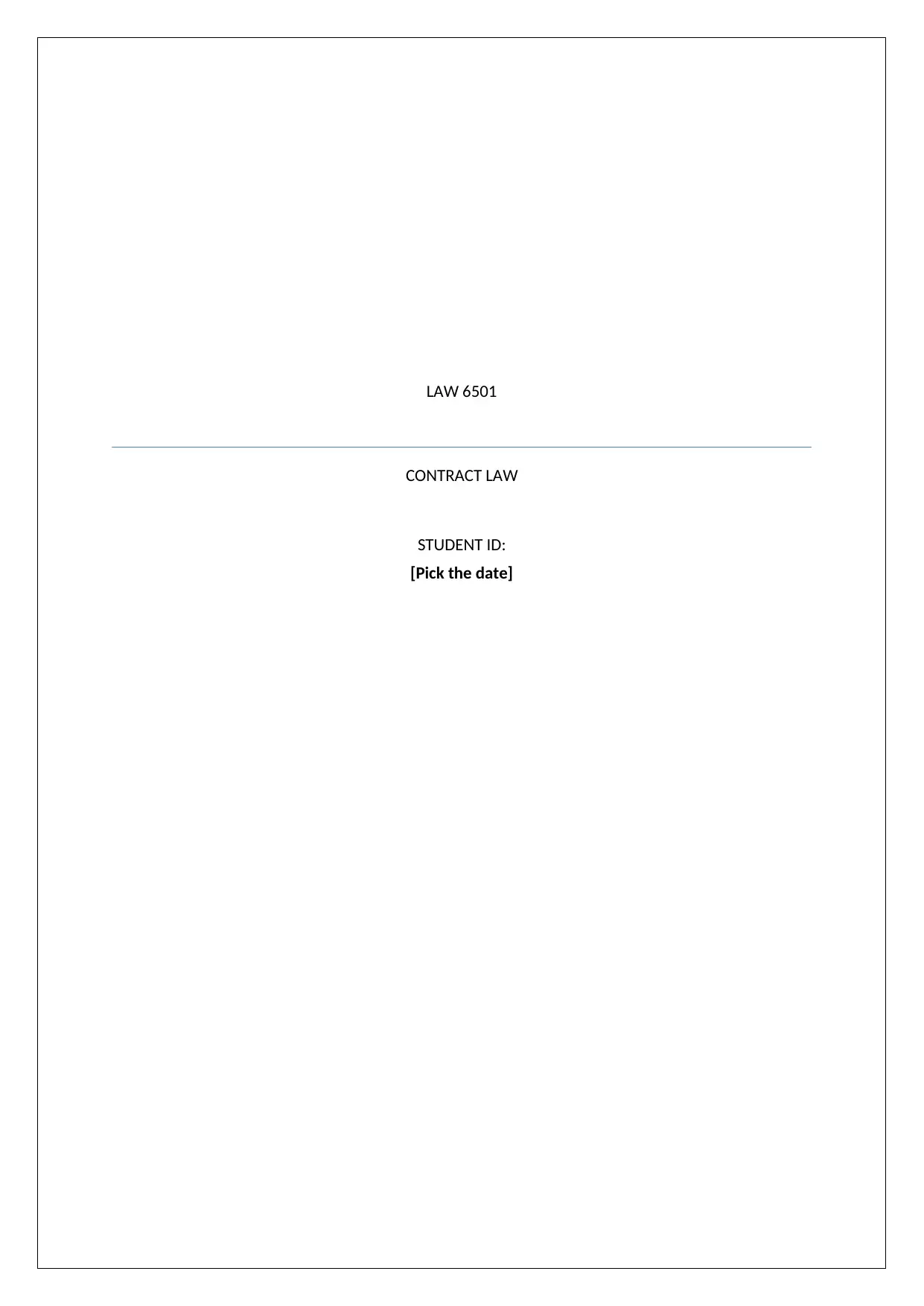
LAW 6501
CONTRACT LAW
STUDENT ID:
[Pick the date]
CONTRACT LAW
STUDENT ID:
[Pick the date]
Paraphrase This Document
Need a fresh take? Get an instant paraphrase of this document with our AI Paraphraser
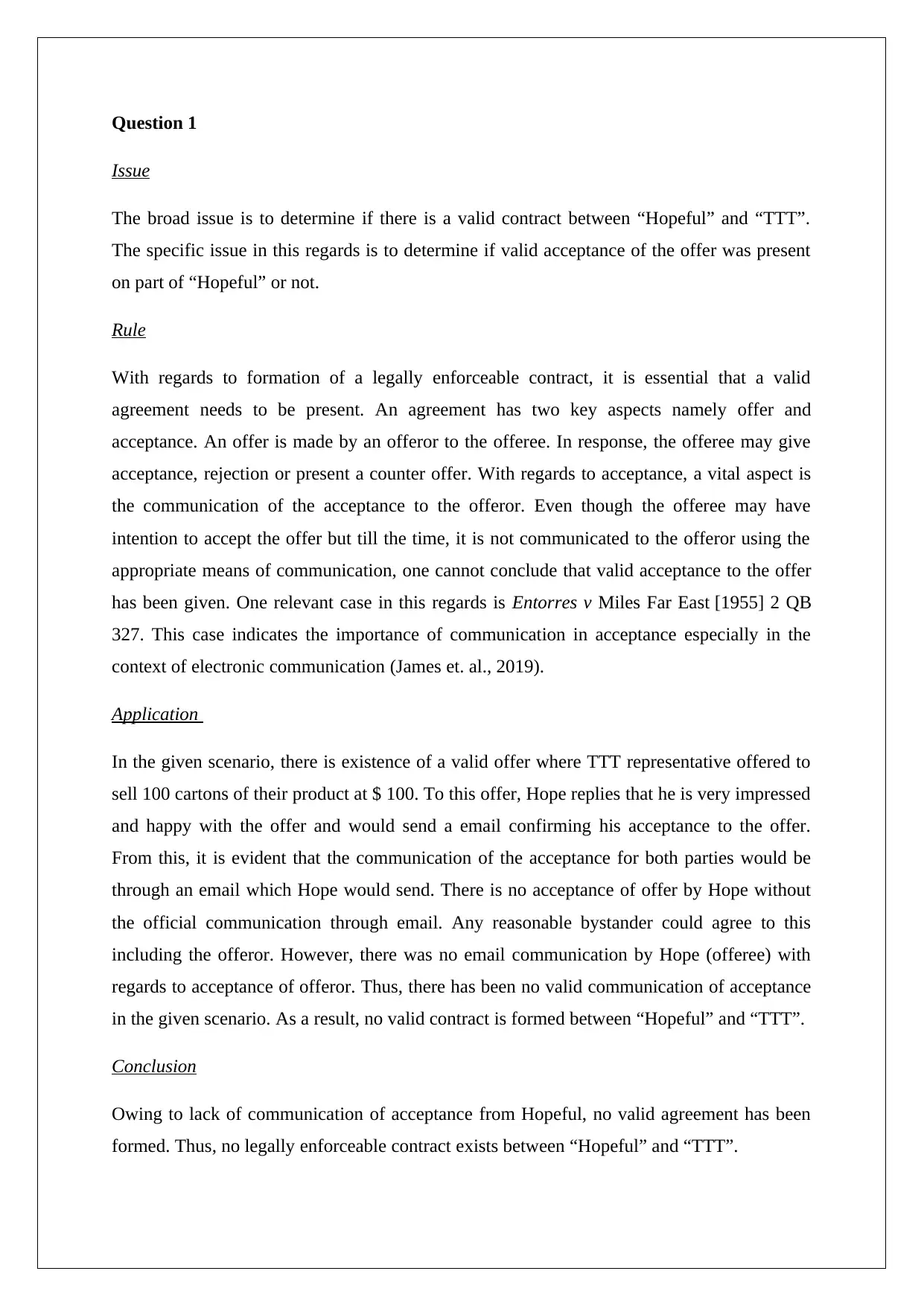
Question 1
Issue
The broad issue is to determine if there is a valid contract between “Hopeful” and “TTT”.
The specific issue in this regards is to determine if valid acceptance of the offer was present
on part of “Hopeful” or not.
Rule
With regards to formation of a legally enforceable contract, it is essential that a valid
agreement needs to be present. An agreement has two key aspects namely offer and
acceptance. An offer is made by an offeror to the offeree. In response, the offeree may give
acceptance, rejection or present a counter offer. With regards to acceptance, a vital aspect is
the communication of the acceptance to the offeror. Even though the offeree may have
intention to accept the offer but till the time, it is not communicated to the offeror using the
appropriate means of communication, one cannot conclude that valid acceptance to the offer
has been given. One relevant case in this regards is Entorres v Miles Far East [1955] 2 QB
327. This case indicates the importance of communication in acceptance especially in the
context of electronic communication (James et. al., 2019).
Application
In the given scenario, there is existence of a valid offer where TTT representative offered to
sell 100 cartons of their product at $ 100. To this offer, Hope replies that he is very impressed
and happy with the offer and would send a email confirming his acceptance to the offer.
From this, it is evident that the communication of the acceptance for both parties would be
through an email which Hope would send. There is no acceptance of offer by Hope without
the official communication through email. Any reasonable bystander could agree to this
including the offeror. However, there was no email communication by Hope (offeree) with
regards to acceptance of offeror. Thus, there has been no valid communication of acceptance
in the given scenario. As a result, no valid contract is formed between “Hopeful” and “TTT”.
Conclusion
Owing to lack of communication of acceptance from Hopeful, no valid agreement has been
formed. Thus, no legally enforceable contract exists between “Hopeful” and “TTT”.
Issue
The broad issue is to determine if there is a valid contract between “Hopeful” and “TTT”.
The specific issue in this regards is to determine if valid acceptance of the offer was present
on part of “Hopeful” or not.
Rule
With regards to formation of a legally enforceable contract, it is essential that a valid
agreement needs to be present. An agreement has two key aspects namely offer and
acceptance. An offer is made by an offeror to the offeree. In response, the offeree may give
acceptance, rejection or present a counter offer. With regards to acceptance, a vital aspect is
the communication of the acceptance to the offeror. Even though the offeree may have
intention to accept the offer but till the time, it is not communicated to the offeror using the
appropriate means of communication, one cannot conclude that valid acceptance to the offer
has been given. One relevant case in this regards is Entorres v Miles Far East [1955] 2 QB
327. This case indicates the importance of communication in acceptance especially in the
context of electronic communication (James et. al., 2019).
Application
In the given scenario, there is existence of a valid offer where TTT representative offered to
sell 100 cartons of their product at $ 100. To this offer, Hope replies that he is very impressed
and happy with the offer and would send a email confirming his acceptance to the offer.
From this, it is evident that the communication of the acceptance for both parties would be
through an email which Hope would send. There is no acceptance of offer by Hope without
the official communication through email. Any reasonable bystander could agree to this
including the offeror. However, there was no email communication by Hope (offeree) with
regards to acceptance of offeror. Thus, there has been no valid communication of acceptance
in the given scenario. As a result, no valid contract is formed between “Hopeful” and “TTT”.
Conclusion
Owing to lack of communication of acceptance from Hopeful, no valid agreement has been
formed. Thus, no legally enforceable contract exists between “Hopeful” and “TTT”.
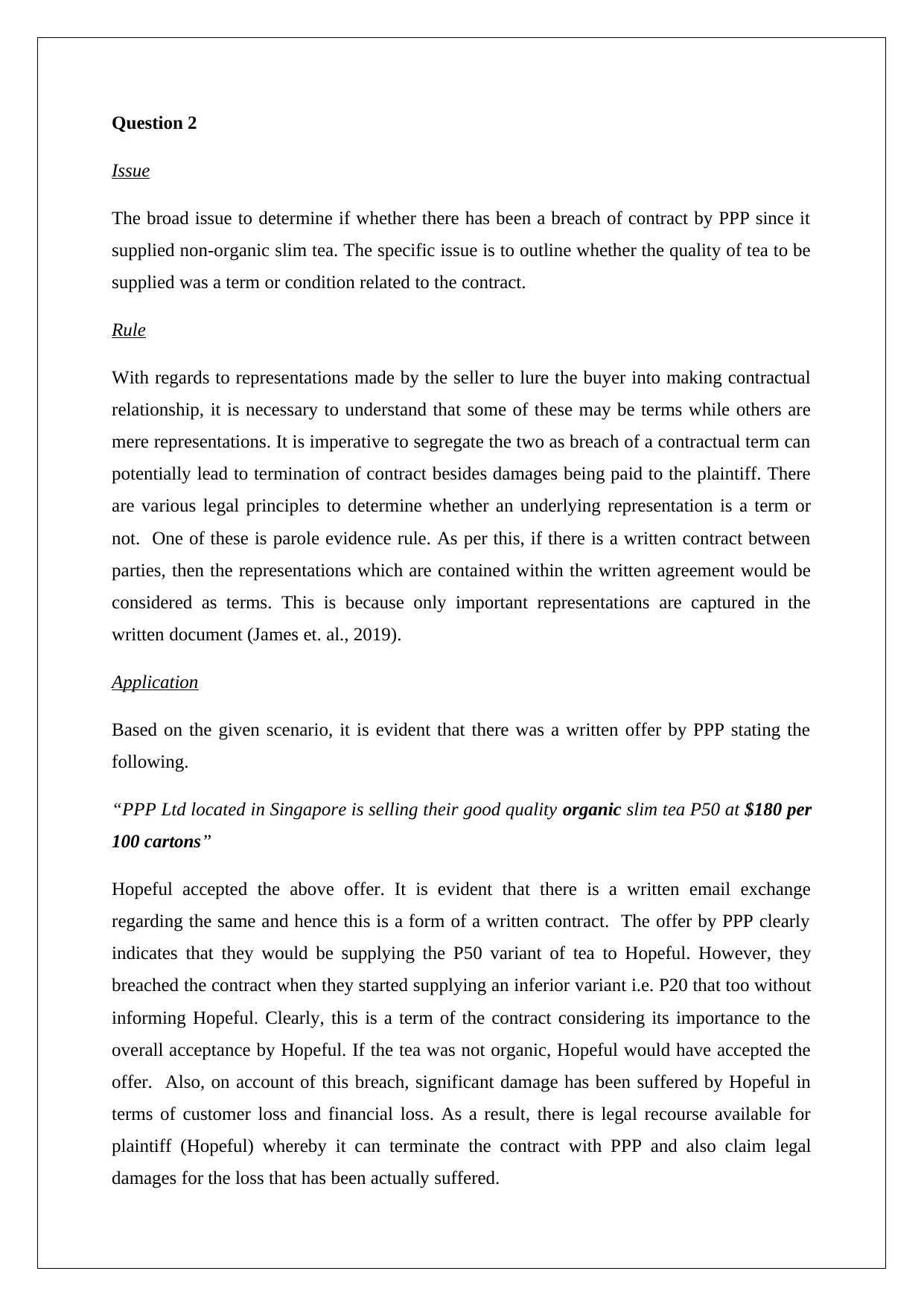
Question 2
Issue
The broad issue to determine if whether there has been a breach of contract by PPP since it
supplied non-organic slim tea. The specific issue is to outline whether the quality of tea to be
supplied was a term or condition related to the contract.
Rule
With regards to representations made by the seller to lure the buyer into making contractual
relationship, it is necessary to understand that some of these may be terms while others are
mere representations. It is imperative to segregate the two as breach of a contractual term can
potentially lead to termination of contract besides damages being paid to the plaintiff. There
are various legal principles to determine whether an underlying representation is a term or
not. One of these is parole evidence rule. As per this, if there is a written contract between
parties, then the representations which are contained within the written agreement would be
considered as terms. This is because only important representations are captured in the
written document (James et. al., 2019).
Application
Based on the given scenario, it is evident that there was a written offer by PPP stating the
following.
“PPP Ltd located in Singapore is selling their good quality organic slim tea P50 at $180 per
100 cartons”
Hopeful accepted the above offer. It is evident that there is a written email exchange
regarding the same and hence this is a form of a written contract. The offer by PPP clearly
indicates that they would be supplying the P50 variant of tea to Hopeful. However, they
breached the contract when they started supplying an inferior variant i.e. P20 that too without
informing Hopeful. Clearly, this is a term of the contract considering its importance to the
overall acceptance by Hopeful. If the tea was not organic, Hopeful would have accepted the
offer. Also, on account of this breach, significant damage has been suffered by Hopeful in
terms of customer loss and financial loss. As a result, there is legal recourse available for
plaintiff (Hopeful) whereby it can terminate the contract with PPP and also claim legal
damages for the loss that has been actually suffered.
Issue
The broad issue to determine if whether there has been a breach of contract by PPP since it
supplied non-organic slim tea. The specific issue is to outline whether the quality of tea to be
supplied was a term or condition related to the contract.
Rule
With regards to representations made by the seller to lure the buyer into making contractual
relationship, it is necessary to understand that some of these may be terms while others are
mere representations. It is imperative to segregate the two as breach of a contractual term can
potentially lead to termination of contract besides damages being paid to the plaintiff. There
are various legal principles to determine whether an underlying representation is a term or
not. One of these is parole evidence rule. As per this, if there is a written contract between
parties, then the representations which are contained within the written agreement would be
considered as terms. This is because only important representations are captured in the
written document (James et. al., 2019).
Application
Based on the given scenario, it is evident that there was a written offer by PPP stating the
following.
“PPP Ltd located in Singapore is selling their good quality organic slim tea P50 at $180 per
100 cartons”
Hopeful accepted the above offer. It is evident that there is a written email exchange
regarding the same and hence this is a form of a written contract. The offer by PPP clearly
indicates that they would be supplying the P50 variant of tea to Hopeful. However, they
breached the contract when they started supplying an inferior variant i.e. P20 that too without
informing Hopeful. Clearly, this is a term of the contract considering its importance to the
overall acceptance by Hopeful. If the tea was not organic, Hopeful would have accepted the
offer. Also, on account of this breach, significant damage has been suffered by Hopeful in
terms of customer loss and financial loss. As a result, there is legal recourse available for
plaintiff (Hopeful) whereby it can terminate the contract with PPP and also claim legal
damages for the loss that has been actually suffered.
⊘ This is a preview!⊘
Do you want full access?
Subscribe today to unlock all pages.

Trusted by 1+ million students worldwide
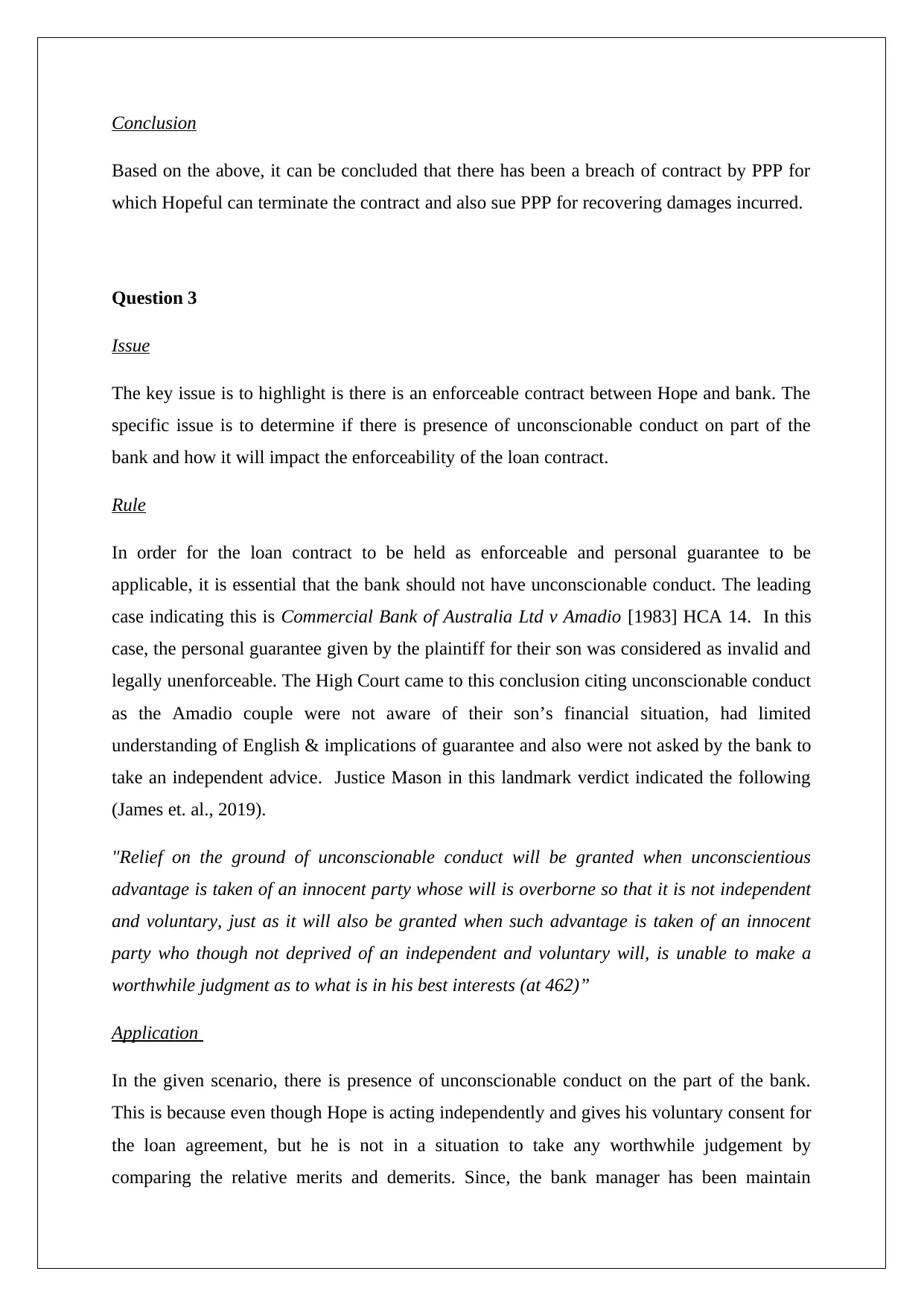
Conclusion
Based on the above, it can be concluded that there has been a breach of contract by PPP for
which Hopeful can terminate the contract and also sue PPP for recovering damages incurred.
Question 3
Issue
The key issue is to highlight is there is an enforceable contract between Hope and bank. The
specific issue is to determine if there is presence of unconscionable conduct on part of the
bank and how it will impact the enforceability of the loan contract.
Rule
In order for the loan contract to be held as enforceable and personal guarantee to be
applicable, it is essential that the bank should not have unconscionable conduct. The leading
case indicating this is Commercial Bank of Australia Ltd v Amadio [1983] HCA 14. In this
case, the personal guarantee given by the plaintiff for their son was considered as invalid and
legally unenforceable. The High Court came to this conclusion citing unconscionable conduct
as the Amadio couple were not aware of their son’s financial situation, had limited
understanding of English & implications of guarantee and also were not asked by the bank to
take an independent advice. Justice Mason in this landmark verdict indicated the following
(James et. al., 2019).
"Relief on the ground of unconscionable conduct will be granted when unconscientious
advantage is taken of an innocent party whose will is overborne so that it is not independent
and voluntary, just as it will also be granted when such advantage is taken of an innocent
party who though not deprived of an independent and voluntary will, is unable to make a
worthwhile judgment as to what is in his best interests (at 462)”
Application
In the given scenario, there is presence of unconscionable conduct on the part of the bank.
This is because even though Hope is acting independently and gives his voluntary consent for
the loan agreement, but he is not in a situation to take any worthwhile judgement by
comparing the relative merits and demerits. Since, the bank manager has been maintain
Based on the above, it can be concluded that there has been a breach of contract by PPP for
which Hopeful can terminate the contract and also sue PPP for recovering damages incurred.
Question 3
Issue
The key issue is to highlight is there is an enforceable contract between Hope and bank. The
specific issue is to determine if there is presence of unconscionable conduct on part of the
bank and how it will impact the enforceability of the loan contract.
Rule
In order for the loan contract to be held as enforceable and personal guarantee to be
applicable, it is essential that the bank should not have unconscionable conduct. The leading
case indicating this is Commercial Bank of Australia Ltd v Amadio [1983] HCA 14. In this
case, the personal guarantee given by the plaintiff for their son was considered as invalid and
legally unenforceable. The High Court came to this conclusion citing unconscionable conduct
as the Amadio couple were not aware of their son’s financial situation, had limited
understanding of English & implications of guarantee and also were not asked by the bank to
take an independent advice. Justice Mason in this landmark verdict indicated the following
(James et. al., 2019).
"Relief on the ground of unconscionable conduct will be granted when unconscientious
advantage is taken of an innocent party whose will is overborne so that it is not independent
and voluntary, just as it will also be granted when such advantage is taken of an innocent
party who though not deprived of an independent and voluntary will, is unable to make a
worthwhile judgment as to what is in his best interests (at 462)”
Application
In the given scenario, there is presence of unconscionable conduct on the part of the bank.
This is because even though Hope is acting independently and gives his voluntary consent for
the loan agreement, but he is not in a situation to take any worthwhile judgement by
comparing the relative merits and demerits. Since, the bank manager has been maintain
Paraphrase This Document
Need a fresh take? Get an instant paraphrase of this document with our AI Paraphraser
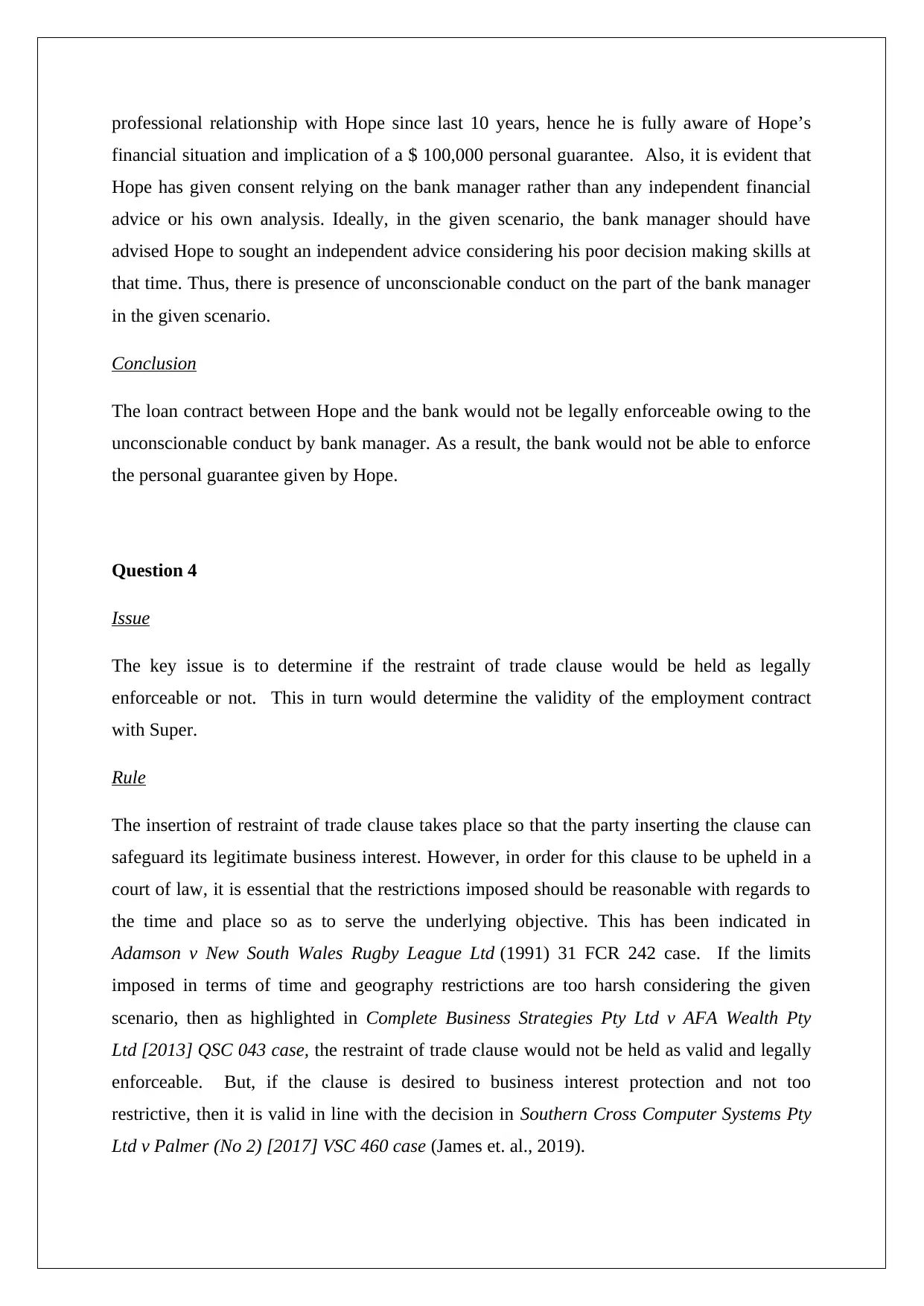
professional relationship with Hope since last 10 years, hence he is fully aware of Hope’s
financial situation and implication of a $ 100,000 personal guarantee. Also, it is evident that
Hope has given consent relying on the bank manager rather than any independent financial
advice or his own analysis. Ideally, in the given scenario, the bank manager should have
advised Hope to sought an independent advice considering his poor decision making skills at
that time. Thus, there is presence of unconscionable conduct on the part of the bank manager
in the given scenario.
Conclusion
The loan contract between Hope and the bank would not be legally enforceable owing to the
unconscionable conduct by bank manager. As a result, the bank would not be able to enforce
the personal guarantee given by Hope.
Question 4
Issue
The key issue is to determine if the restraint of trade clause would be held as legally
enforceable or not. This in turn would determine the validity of the employment contract
with Super.
Rule
The insertion of restraint of trade clause takes place so that the party inserting the clause can
safeguard its legitimate business interest. However, in order for this clause to be upheld in a
court of law, it is essential that the restrictions imposed should be reasonable with regards to
the time and place so as to serve the underlying objective. This has been indicated in
Adamson v New South Wales Rugby League Ltd (1991) 31 FCR 242 case. If the limits
imposed in terms of time and geography restrictions are too harsh considering the given
scenario, then as highlighted in Complete Business Strategies Pty Ltd v AFA Wealth Pty
Ltd [2013] QSC 043 case, the restraint of trade clause would not be held as valid and legally
enforceable. But, if the clause is desired to business interest protection and not too
restrictive, then it is valid in line with the decision in Southern Cross Computer Systems Pty
Ltd v Palmer (No 2) [2017] VSC 460 case (James et. al., 2019).
financial situation and implication of a $ 100,000 personal guarantee. Also, it is evident that
Hope has given consent relying on the bank manager rather than any independent financial
advice or his own analysis. Ideally, in the given scenario, the bank manager should have
advised Hope to sought an independent advice considering his poor decision making skills at
that time. Thus, there is presence of unconscionable conduct on the part of the bank manager
in the given scenario.
Conclusion
The loan contract between Hope and the bank would not be legally enforceable owing to the
unconscionable conduct by bank manager. As a result, the bank would not be able to enforce
the personal guarantee given by Hope.
Question 4
Issue
The key issue is to determine if the restraint of trade clause would be held as legally
enforceable or not. This in turn would determine the validity of the employment contract
with Super.
Rule
The insertion of restraint of trade clause takes place so that the party inserting the clause can
safeguard its legitimate business interest. However, in order for this clause to be upheld in a
court of law, it is essential that the restrictions imposed should be reasonable with regards to
the time and place so as to serve the underlying objective. This has been indicated in
Adamson v New South Wales Rugby League Ltd (1991) 31 FCR 242 case. If the limits
imposed in terms of time and geography restrictions are too harsh considering the given
scenario, then as highlighted in Complete Business Strategies Pty Ltd v AFA Wealth Pty
Ltd [2013] QSC 043 case, the restraint of trade clause would not be held as valid and legally
enforceable. But, if the clause is desired to business interest protection and not too
restrictive, then it is valid in line with the decision in Southern Cross Computer Systems Pty
Ltd v Palmer (No 2) [2017] VSC 460 case (James et. al., 2019).
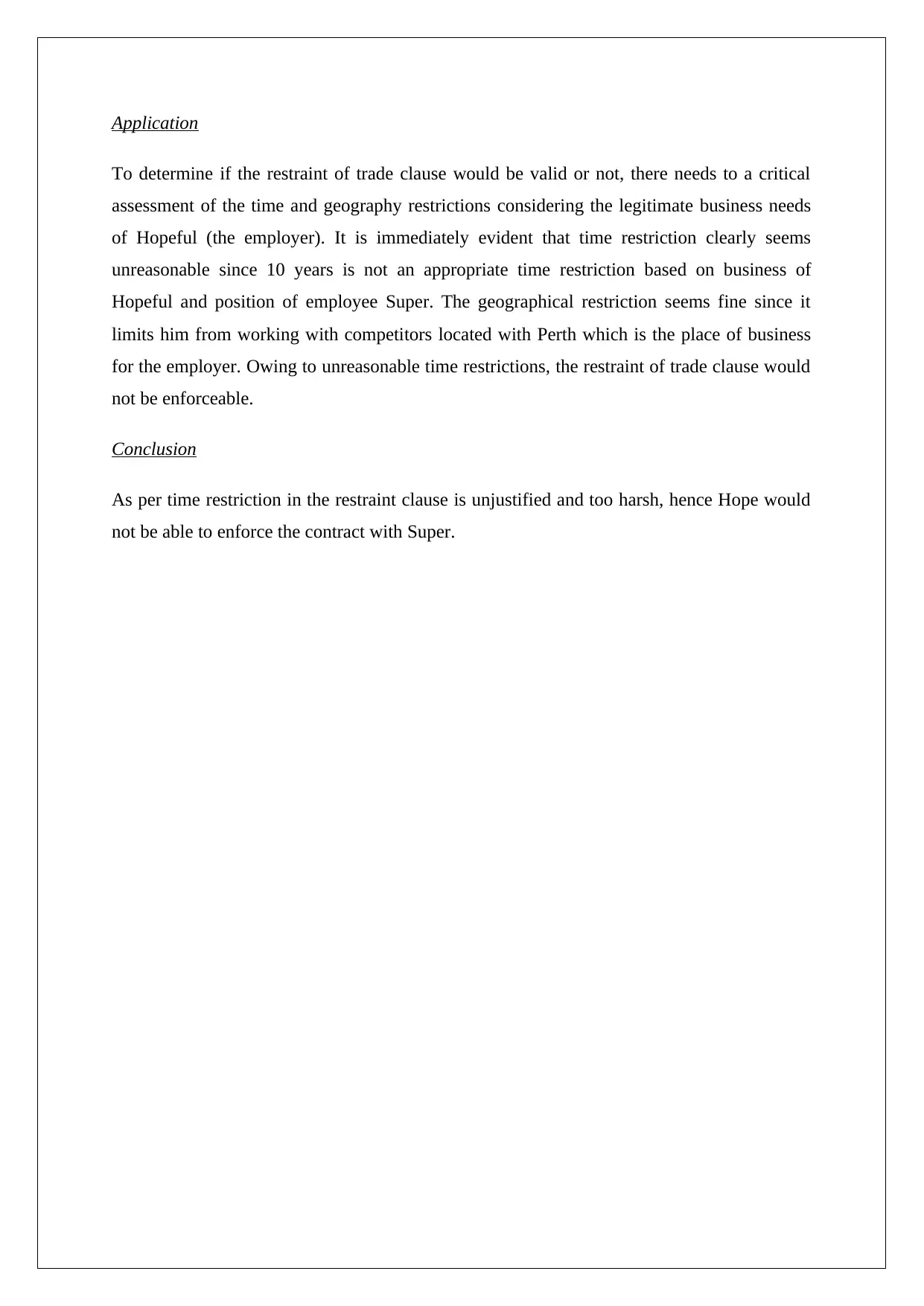
Application
To determine if the restraint of trade clause would be valid or not, there needs to a critical
assessment of the time and geography restrictions considering the legitimate business needs
of Hopeful (the employer). It is immediately evident that time restriction clearly seems
unreasonable since 10 years is not an appropriate time restriction based on business of
Hopeful and position of employee Super. The geographical restriction seems fine since it
limits him from working with competitors located with Perth which is the place of business
for the employer. Owing to unreasonable time restrictions, the restraint of trade clause would
not be enforceable.
Conclusion
As per time restriction in the restraint clause is unjustified and too harsh, hence Hope would
not be able to enforce the contract with Super.
To determine if the restraint of trade clause would be valid or not, there needs to a critical
assessment of the time and geography restrictions considering the legitimate business needs
of Hopeful (the employer). It is immediately evident that time restriction clearly seems
unreasonable since 10 years is not an appropriate time restriction based on business of
Hopeful and position of employee Super. The geographical restriction seems fine since it
limits him from working with competitors located with Perth which is the place of business
for the employer. Owing to unreasonable time restrictions, the restraint of trade clause would
not be enforceable.
Conclusion
As per time restriction in the restraint clause is unjustified and too harsh, hence Hope would
not be able to enforce the contract with Super.
⊘ This is a preview!⊘
Do you want full access?
Subscribe today to unlock all pages.

Trusted by 1+ million students worldwide
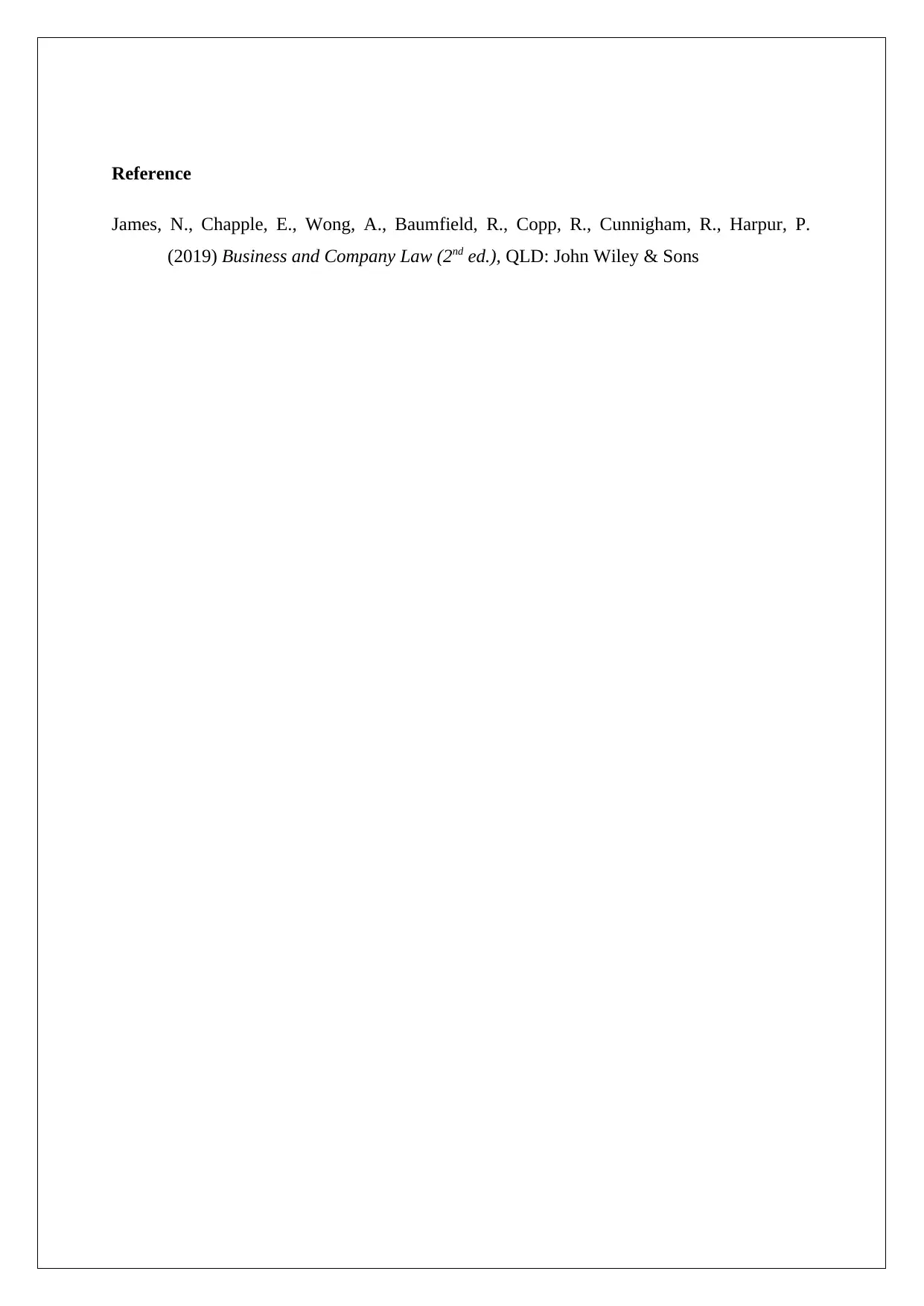
Reference
James, N., Chapple, E., Wong, A., Baumfield, R., Copp, R., Cunnigham, R., Harpur, P.
(2019) Business and Company Law (2nd ed.), QLD: John Wiley & Sons
James, N., Chapple, E., Wong, A., Baumfield, R., Copp, R., Cunnigham, R., Harpur, P.
(2019) Business and Company Law (2nd ed.), QLD: John Wiley & Sons
1 out of 7
Related Documents
Your All-in-One AI-Powered Toolkit for Academic Success.
+13062052269
info@desklib.com
Available 24*7 on WhatsApp / Email
![[object Object]](/_next/static/media/star-bottom.7253800d.svg)
Unlock your academic potential
Copyright © 2020–2025 A2Z Services. All Rights Reserved. Developed and managed by ZUCOL.





